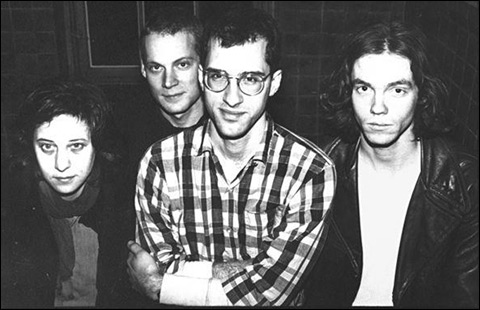
DEAD SERIOUS “I can’t believe I wrote some of those lyrics,” says Zedek. “It’s fun, but it’s also been really hard and painful to relive some of that stuff.” |
"I had already pretty much been around the block at the time," says Thalia Zedek. We're at Deep Ellum (which has cleared out for the afternoon) in Allston, talking about the salad days of 1990, when Zedek and a new Boston quartet called Come were just beginning their grim assault on our emotional well-being.
At 29, she had already done time in a slew of jagged-edged bands in Boston and New York. It wasn't "last chance" territory — Zedek and her cohort had proved themselves hard-wired to grow new projects out of the ashes of past ones — but time was critical. The new line-up was all underground vets: Codeine's Chris Brokaw plus Athens (Georgia) transplants Arthur Johnson and Sean O'Brien, all coming from different corners of the post-punk tidewaters, which were as musically fertile as they were vile.
The group could have just rehashed past glories, but they had different plans. The stuff they came up with was primal and noisy, but draped with earnest emotions, swelling hooks, and scribbled personal details that almost seemed like throwbacks. It was a rock band.
Johnson and O'Brien left in '95, and Come ceased to exist in 2001 when Zedek and Brokaw branched off into solo work. Fans and friends never forgot, and Come still hold a place among Boston's rock elite. We get a rare chance to relive the voodoo Sunday at T.T. the Bear's, when the original line-up — the group responsible for 11:11 and Don't Ask, Don't Tell — reunites for the first time in 15 years.
"It was never really that thought out," says Zedek of the band's origins. "I had seen so many different styles of music — no-wave, hardcore — that it was a decision to just write songs and play naturally, not be classified as any sort of genre."
Come mined dirty jukeboxes for useful skeletons on which to hang all kinds of dissonance. Sometimes the result approached camp, like the lurching "Jailhouse Rock" intro to "Dead Molly," but even those moments pointed to smirking ancestors like the Birthday Party, who had revered and ripped up honky-tonk clichés 10 years earlier. Usually, Come sounded dead serious.
"I can't believe I wrote some of those lyrics," says Zedek. "They're sick. It's fun, but it's also been really hard and painful to relive some of that stuff." She adds that sometimes a song is a just a song and not a torn-out diary page. "It might have been a sexist thing. When men write heavy stuff, they're a serious writer. If a girl does it, she's fucked up."
The years leading up to Come had been particularly trying for Zedek, who had recorded two albums and caterwauled across stages nationwide singing for New York's Live Skull and fought through a fairly public heroin addiction. Returning to Boston, where she had established roots while breaking ground in bands like Uzi, Dangerous Birds, and White Women, was a good move. By the time Come were writing, she'd turned a corner.